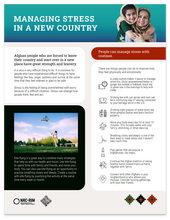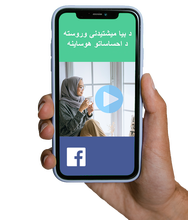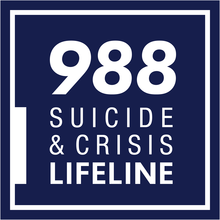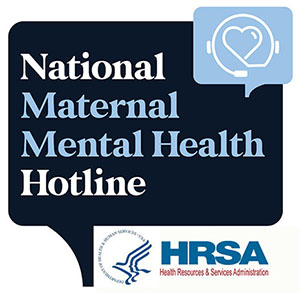
Tools for Organizations to Support the Mental Health of Afghan Newcomers
Afghan people who are forced to leave their country and start over in a new place have great strength and bravery. It is also a very difficult thing to do. It is common for people who have experienced difficult things to have feelings like fear, anger, sadness and sorrow at the same time that they feel relieved or glad to be safe.
This collection of health communications, promising practices, checklists, guides, and training opportunities will help any organization improve their efforts to support Afghan newcomers as they navigate the complicated emotions and stressors that come with migration.
If you need technical assistance regarding mental health for newcomers, visit our friends at CARRE
Mental Health and Stress Collection
This health education collection, available in Dari, Pashto and English, equips Afghan newcomers with the skills to manage the stress that comes with migration to a new country and culture. Fact sheets, social media assets, text message scripts, and audio/video resources are available pre-translated in customizable formats for any organization to use.
Conversation Guide: Managing with Stress in a New Country
This conversation guide is aimed at equipping service providers and bilingual community leaders to talk with Afghan newcomers about managing the stress that comes with migration to a new country and culture. By focusing on stress management, the guide addresses Afghans’ mental health needs in a culturally relevant way.
Facebook Live: Emotional Wellbeing Post Resettlement
During this Facebook Live event, participants discussed the effects of stress on them as individuals and as a family, coping skills, and what to do when stress becomes unmanageable. Recordings are available on the Settle In Facebook Page.
Webinar Recording: Supporting the Emotional Well-being of Afghan Newcomers
During this webinar, participants will gain insight into mental health risks and access barriers encountered by Afghan newcomers. Discover culturally sensitive and linguistically accessible resources tailored to support this community, offering actionable guidance for service providers. Hear firsthand accounts from providers on effectively implementing these resources in their work.
USCRI National Helpline
The U.S. Committee for Refugees and Immigrants set up a 24/7 national crisis hotline to support newly resettled Afghans. Counseling is provided on a need-to-need basis, and referrals to the appropriate services are provided immediately. Cases in need of emergency intervention will be flagged to a Crisis Response Team. Download a flyer in English and Dari/Pashto.
988 Lifeline
When people call the 988 Lifeline, they are connected to counselors trained to provide free and confidential emotional support and crisis counseling to people in suicidal crisis or emotional distress, and connect them to resources. The 988 Lifeline offers an interpretation service in over 240 languages and dialects; the average time to be connected to an interpreter is 17 seconds. These services are available 24/7 across the United States.
National Maternal Mental Health Hotline
The National Maternal Mental Health Hotline provides 24/7, free, confidential support before, during, and after pregnancy. The Hotline offers callers phone or text access to professional counselors, real-time support and information, response within a few minutes, 24 hours a day, 7 days a week, referrals to local and telehealth providers and support groups, and culturally sensitive support. Interpreter services are available in 60 languages, including Dari and Pashto. Note Dari and Pashto support is only available via phone and not via text.
Learn More >>
Mental Health Service Mapping for Afghan Newcomers
Service mapping helps providers to build a more robust continuum of care or connect clients to needed and durable support. This resource is designed to help service providers working with forcibly displaced individuals, children and families in the U.S. who may be experiencing mental health symptoms or concerns.
Culturally & Trauma-Informed Approaches to Assisting Displaced Afghan Families
This document offers guidance on how to be culturally- and trauma-informed while assisting displaced Afghan families. Learn practical strategies to build connection and trust, help maintain and strengthen family relationships, and align with child and family goals while using a strength-based approach.
Social Support Services for RIM Communities
Collaborating and partnering with local social support and community-based organizations enhances a health department’s ability to provide culturally and linguistically resources and supports to RIM communities.
RHS-15 Screening Tool
The RHS-15 is a tool for screening refugees for emotional distress and mental health. Existing instruments are not designed for refugees or may be cumbersome to administer in health care settings. The RHS-15 was developed in a community public health setting to be an efficient and effective way to sensitively detect the range of emotional distress common across refugee groups.
Considerations in Using Mental Health Screening Measures with Afghan Clients
A mental health screener is a list of standard questions that help identify the possible presence of a mental health condition. Screening measures are usually short so that they can be administered or taken quickly, allowing the screening to be integrated into other processes. For example, a primary care appointment or as part of a broader intake into client services.
Facilitating Discussions About Mental Health With Afghan Newcomer Communities
This guide, created by Switchboard in partnership with Boston College, is intended to define mental health and trauma while explaining the common mental health struggles that resettled Afghans may face. Service providers and readers will also learn about barriers to accessing mental health services Afghan newcomers may encounter.
Faith-based Healing among Afghan Muslims: Guidance for Refugee Service Providers in the U.S.
Supporting faith-based practices is one important way that service providers can help meet the mental health needs of Afghan Muslim clients. This guide will give you a brief introduction to Islam to help you understand how faith-based practices can help Muslim clients cope with trauma and promote healing.
Behavioral Health Assistance for Afghans
USCRI’s Refugee Health Services has developed a dynamic and multi-tiered behavioral health support services program aimed at mitigating resettlement challenges by expanding access to culturally and linguistically tailored, trauma-informed behavioral health services for resettled Afghan arrivals across the nation.
Afghan Adjustment Support Groups
Learn in this promising practice how The Afghan Adjustment Support Groups, led by IRC in Sacramento and Oakland, offer Afghan newcomers a safe space to share experiences, learn coping strategies, and navigate resettlement challenges. These 8-week, remote sessions, led by culturally sensitive facilitators, cover topics like culture shock, mental health, and personal goals, tailored for both adults and youth.
Learn More >>
Mental Health and Social Support Programming for Afghan Newcomers
Learn about the challenges and support strategies for addressing mental health among Afghan refugees resettled in the United States through Operation Allies Welcome (OAW). Learn about initiatives like healing circles in Washington state and social support programs in Minnesota that provide culturally appropriate mental health support for Afghan newcomers.
Supporting Mental Health in RIM Communities During COVID-19 and Beyond
Learn how health departments, agencies, and organizations engage with RIM communities to provide essential mental health support. Explore success stories from Arizona to California and unlock promising practices with NRC-RIM's technical assistance.
Mental health referrals must always be sensitive to the needs and concerns of the client. People who have been forcibly displaced people may have unique considerations that must be taken into account, including but not limited to:
Medical History
Due to conflict or crisis, many people forcibly displaced have spent periods of time in locations where food is inadequate, there is little or no clean drinking water, violence is endemic, and conditions bleak. Certain diseases, malnutrition, and the consequences of some injuries can sometimes look like mental health symptoms.
Consider referring to a medical health provider to rule out a medical cause, especially if the client is new to the U.S., has non-specific symptoms like body pain or extreme fatigue, or has a history of 1) injuries due to violence or conflict, 2) food deprivation, or 3) significant illness.
Casualty and Worldview
U.S. mental health is primarily understood through a bio/psycho/social lens. Other countries and cultures may have a different understanding of mental health, including body humors, spirits, curses, religious tests, and karma. In addition, mental health service provision in the U.S. is mainly based on a Western worldview that puts individuals at the center and views time as linear. It prioritizes things like facts, structure and hierarchy. Other countries and cultures may have different worldviews that put groups or communities at the center, view time as non-linear or cyclical, and prioritize things like spirituality and connectedness.
Consider referring to the community based, non-specialized services when it is safe and appropriate to do so as these are most likely to be culturally congruent and linguistically accessible. If highly specialized services are needed, try to find an agency or provider that has familiarity working with people and communities with various belief systems and is able to integrate these belief systems into care.
Familiarity
Many countries in the world lack mental health infrastructures. For example, Afghanistan has one mental health hospital where patients are commonly heavily sedated or chained. The Democratic Republic of Congo has just one inpatient hospital and one outpatient mental health clinic. People new to the U.S. from countries with little or no mental health infrastructure may be unfamiliar with effective and humane treatment.
Consider utilizing a referral script that provides elements of psychoeducation, de-stigmatization and normalization. For example, “Based on what you have told me, it sounds like having more support might be helpful. This is common for many people who are new to the U.S. and who have been through the types of things you have been through. In the U.S. people often find mental health counseling helpful. In some countries, mental health means the same as “crazy.” That is not true in the U.S. In the U.S., mental health has to do with how you feel emotionally, think, and act. For all of us, how we think, feel, and act is influenced by what has happened to us and what is happening in our lives now. A counselor or therapist is a professional who helps support people when they have difficult life challenges or are trying to heal from the past. Is this something you think might be helpful to you?”
History of Psychiatric Abuse
In some countries, psychiatry has been used as a political tool of oppression on dissidents, those who identify as LGBTQIA+, people with certain religious beliefs, and more. This can make members of certain communities or groups particularly fearful of mental health services.
Consider doing research on countries who have or continue to use psychiatry as a political tool of oppression. Clients from those countries may need to be approached with particular care. Encouraging these clients to talk to a trusted medical provider can often be a safe entry point.
Language
Language access is critical to appropriate care and support. Still, even with accurate interpretation and translation, it is essential to note that certain words and expressions may have different meanings or simply not exist in other cultures. For example, there is no direct translation for the word “depression’ in Khmer or anxiety in Gujarati. Idioms like “feeling blue” or “feeling down” may be completely unknown in other cultures.
Consider using specific and simple words when talking and avoid idioms of expression. For example, say, “I notice that you are crying a lot and often seem sad” instead of “you seem depressed” or “worrying a lot” instead of “anxiety.” Ask people how they might describe something in their language. For example, “Can you describe what that looks like?” and “What is the word or expression for that in your language?”
Confidentiality
In many countries, confidentiality when receiving medical or mental health services is not guaranteed and people may fear that their most sensitive concerns and issues will be spread in the community, especially if an interpreter is present.
Consider explaining and emphasizing confidentiality in all referrals, especially if an interpreter is present. For example, “In the U.S., all medical and mental health services are confidential. Providers cannot talk about a patient or client without their permission. This includes interpreters. This law is taken very seriously. Medical providers, counselors, interpreters, and other people who provide care can get in trouble and even possibly lose their jobs if they disclose things without a client or patient’s permission. The only exceptions to this are if someone is a danger to - themselves or others.”
Context
Counseling may ask people to discuss and process difficult events and feelings. People who have been forcibly displaced may have lived in survival mode for decades. Being vulnerable enough to “feel” can be a liability in an environment in which staying alive requires suppressing one’s emotions and maintaining toughness. In addition, many forcibly displaced people, especially if they are new to the U.S., are facing daily pressures and struggles to find a job, pay their bills, learn English, and much more. They may have family and friends who are in harm’s way and may be receiving bad news frequently about people they know and care about. “Talk therapy” can seem useless and impractical.
Consider referring clients to services and support that meet their basic needs, or making a referral to a clinic or provider that will integrate case management into service provision. In addition, make sure that agencies and providers are willing to go at the client’s pace and take into account their level of stability and competing demands when delivering services.

Psychological First Aid (PFA)
This 5-hour interactive online course helps participants learn the core actions of PFA and describes ways to apply them in different post-disaster scenarios and with different survivor needs. This course also covers provider well-being before, during, and after disasters.

Skills for Psychological Recovery (SPR)
This 5-hour interactive course is designed for providers to help survivors gain skills to manage distress and cope with post-disaster stress and adversity. This course is for individuals who want to learn about using SPR, learning the goals and rationale of each core skill, delivering SPR, and supporting survivors in the aftermath of a disaster or traumatic event.

Suicide Prevention in Resettlement, Asylum and Integration Settings
This online course focuses on the foundational skills of suicide prevention. You will learn about suicide, what steps all direct service staff can take to prevent suicide, and how to use suicide prevention practices with your clients.
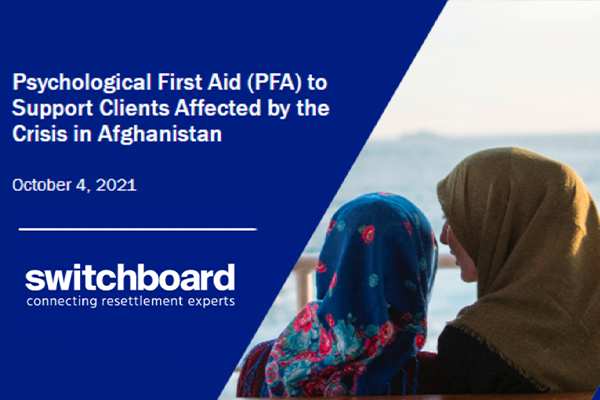
Psychological First Aid (PFA) to Support Clients Affected by the Crisis in Afghanistan
PFA is an evidence-based intervention designed to help mitigate psychological distress and to facilitate coping and functioning in the immediate aftermath of disasters and other tragic events. This webinar reviews the basic principles of PFA with special consideration given to supporting people affected by the crisis in Afghanistan.
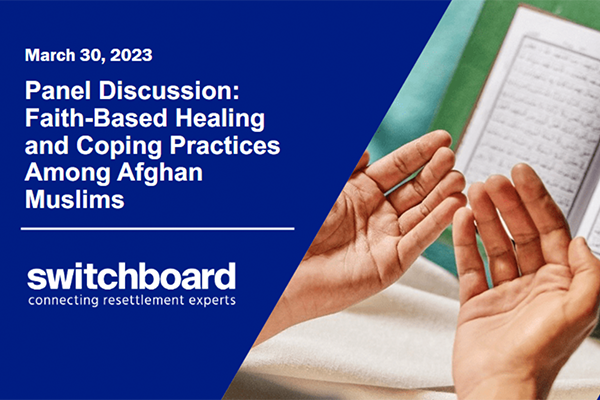
Faith-Based Healing and Coping Practices Among Afghan Muslims
Faith-based supports can decrease social isolation, create a sense of belonging, and help newcomers heal from trauma. This webinar explores how faith-based practices can help Afghan Muslims cope with the impacts of trauma and resettlement stressors, as well as support their transitions into their new communities.
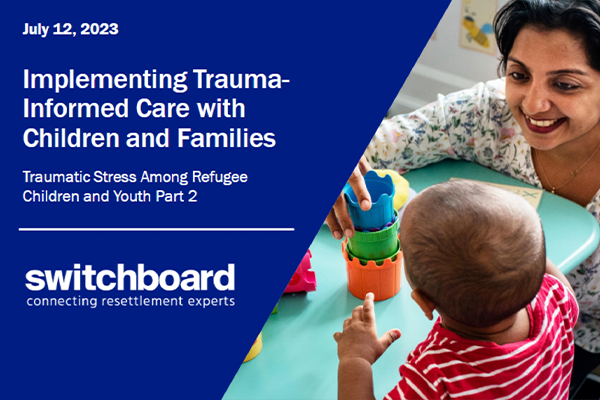
Implementing Trauma-Informed Care with Refugee Children and Families
This webinar equips participants to identify the basic principles of a trauma-informed, rights-based approach to newcomer service provision and describe how to use a trauma-informed approach when working with newcomer children and families. It is designed for direct service staff, including caseworkers, healthcare professionals, mental health professionals, educators, and others working with newcomer children and families.

Podcast: A Discussion on Refugee Mental Health
This episode of a podcast by Switchboard features a conversation with Megan Rafferty, Switchboard's training officer with a focus on mental health and wellness, and Selina Máté, Switchboard's digital content manager with a background in case management. We discuss ways to support newcomers with a trauma-informed lens.
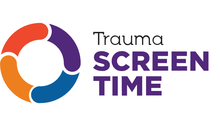
Trauma ScreenTIME
The Trauma ScreenTIME Pediatric Primary Care Course is a free online training course on how to screen children for trauma in pediatric primary care settings. This training was developed by the Child Health and Development Institute in collaboration with families and national experts from the NCTSN based on current research and best practices. The course is appropriate for child-serving staff in various roles within a pediatric primary care setting, including leadership, frontline clinical staff, and administrative staff.
